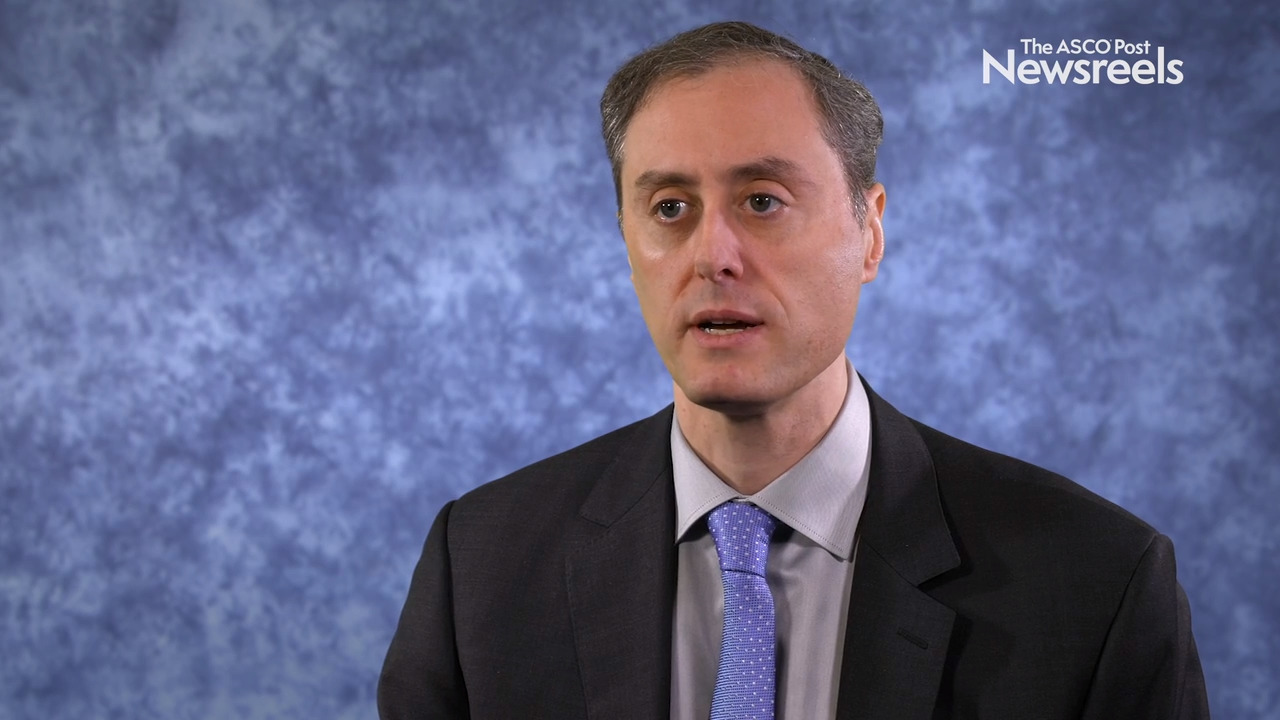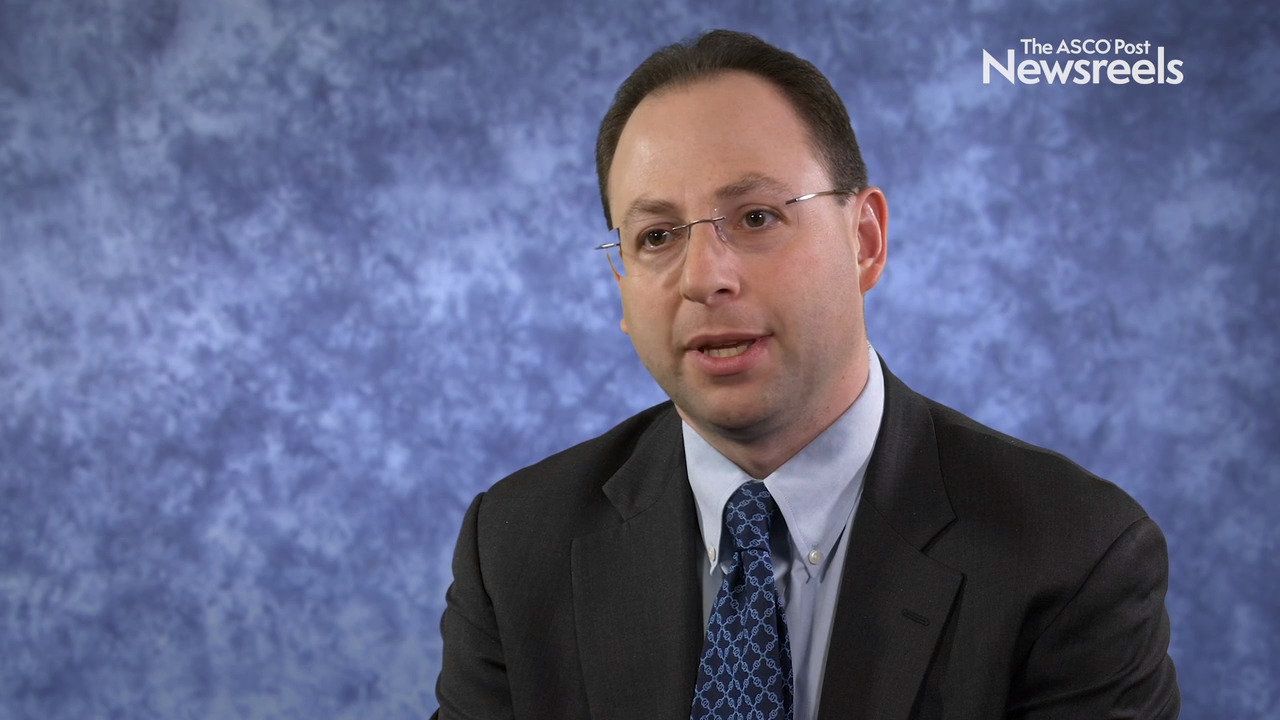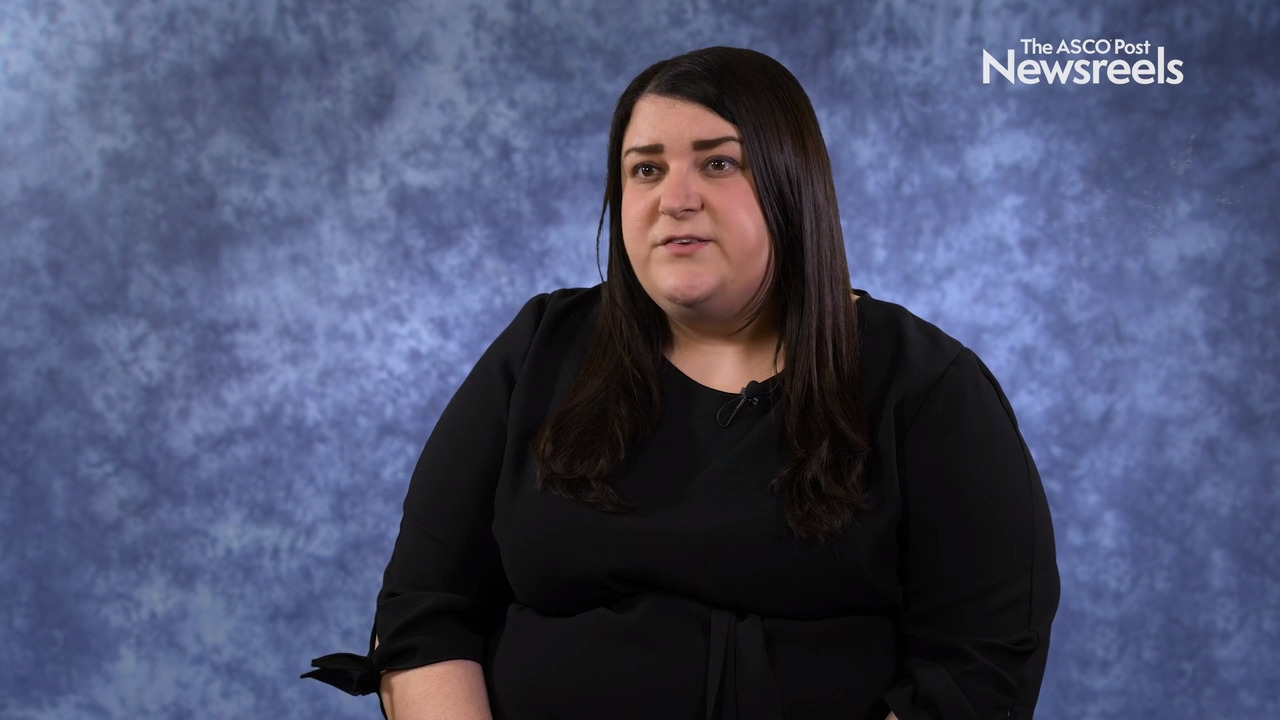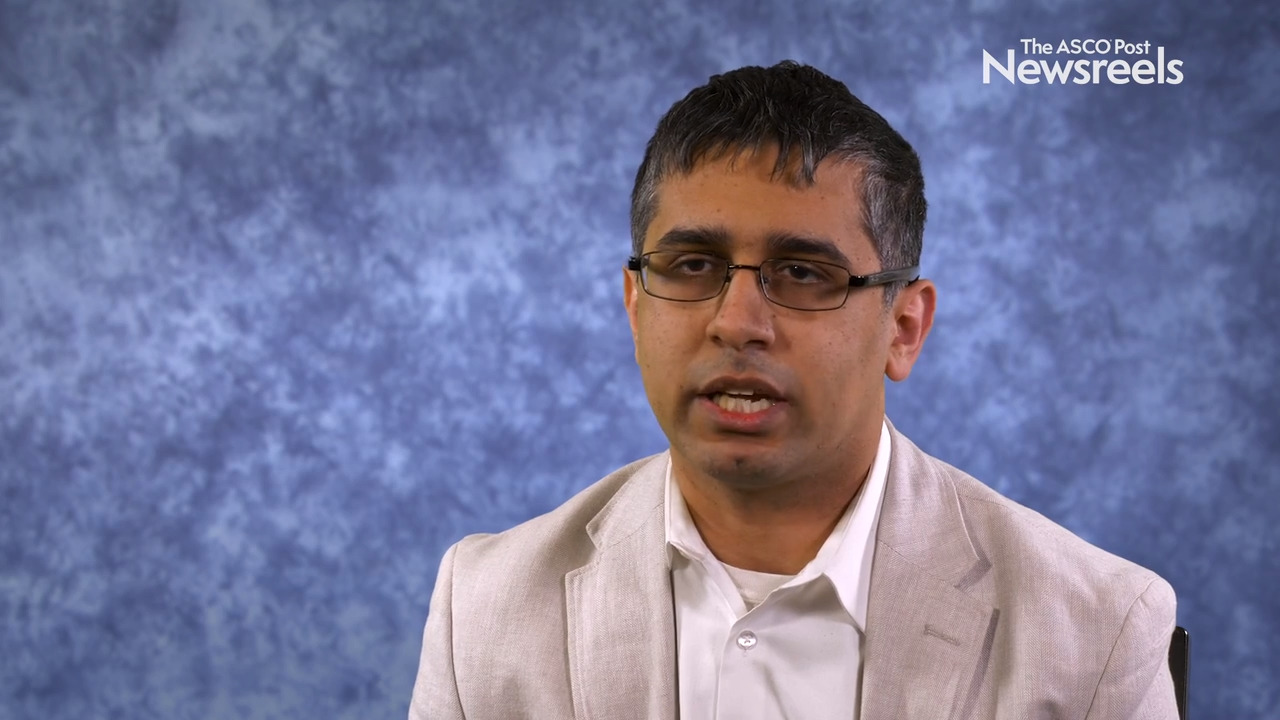Expert Point of View: Javier Pinilla-Ibarz, MD, PhD
Javier Pinilla-Ibarz, MD, PhD, of Moffitt Cancer Center, Tampa, Florida, commented on this study: “ELEVATE TN compared front-line treatment with acalabrutinib alone or in combination with obinutuzumab vs obinutuzumab/chlorambucil and showed that a second-generation Bruton’s tyrosine kinase (BTK)...
Acalabrutinib Plus Obinutuzumab Superior to Obinutuzumab Plus Chlorambucil as Front-Line Treatment of CLL
Ibrutinib was the first Bruton’s tyrosine kinase (BTK) inhibitor to dramatically transform the treatment of patients with chronic lymphocytic leukemia (CLL) and other hematologic malignancies. The second-generation BTK inhibitor acalabrutinib is a more selective BTK inhibitor designed to have an...
Expert Point of View: Charles G. Drake, MD, PhD
In an interview with The ASCO Post, Charles G. Drake, MD, PhD, expounded on the results of the COSMIC-021 trial. Dr. Drake is Division Director for GU Oncology, Co-Director of the Cancer Immunotherapy Program, and Co-Leader of the Tumor Biology and Microenvironment Program at the Herbert Irving...
Novel Combination of Cabozantinib Plus Atezolizumab Shows Benefit in Patients With Advanced Prostate Cancer
The combination of the small-molecule tyrosine kinase inhibitor cabozantinib (inhibits VEGF, AXL, MET, and others), plus the immune checkpoint inhibitor atezolizumab achieved encouraging activity in patients with metastatic castration-resistant prostate cancer, according to the results of...
Expert Point of View: Richard L. Schilsky, MD, FACP, FSCT, FASCO
Richard L. Schilsky, MD, FACP, FSCT, FASCO, ASCO’s Chief Medical Officer and a gastrointestinal oncologist himself, was pleased to see the TAPUR study bearing fruit among patients with metastatic colorectal cancer. “Colorectal cancer is a very common disease, but we have not made much progress in...
ASCO’s TAPUR Study: Biomarker-Driven Treatment Paying Off in Colorectal Cancer
New data presented at the 2020 Gastrointestinal Cancers Symposium are validating the purpose of ASCO’s Targeted Agent and Profiling Utilization Registry (TAPUR) study, a multibasket trial that matches patients’ genomic alterations to commercially available targeted therapies. The aim is to learn...
Expert Point of View: Jarushka Naidoo, MBBCh
“The investigators of the current study tested the hypothesis that vitamin D supplementation is associated with a reduced risk of checkpoint-induced colitis by rigorously assessing 37 variables in both discovery and validation cohorts,” said invited discussant Jarushka Naidoo, MBBCh, Assistant...
Vitamin D Supplementation May Protect Against Checkpoint Inhibitor–Induced Colitis
Vitamin D supplementation prior to starting immune checkpoint inhibitor therapy may significantly reduce the odds of developing colitis, according to a study conducted at Harvard Medical School. Although this was a retrospective chart review, the association was relatively strong in the...
Small Study Explores Impact of Novel Regimen on Pembrolizumab for Triple-Negative Breast Cancer
In the phase II KEYNOTE-890 trial, patients with inoperable advanced triple-negative breast cancer who received one intratumoral tavokinogene telseplasmid injection followed by electroporation and pembrolizumab, several patients with skin or subcutaneous tumors saw metastatic lesions disappear,...
Phase III SOPHIA Trial Evaluates Margetuximab/Chemotherapy vs Trastuzumab/Chemotherapy for HER2-Positive Breast Cancer
The second interim analysis of the phase III SOPHIA trial demonstrated a significant though modest improvement in progression-free survival, response rate, and clinical benefit with the addition of margetuximab to chemotherapy vs trastuzumab plus chemotherapy in patients with HER2-positive...
Phase III KEYNOTE-522: Pembrolizumab Benefits Outcome in Neoadjuvant, Adjuvant Settings in Triple-Negative Breast Cancer
In patients with triple-negative breast cancer, the addition of pembrolizumab to neoadjuvant and adjuvant chemotherapy achieves higher rates of pathologic complete response compared with placebo, according to results of the phase III KEYNOTE-522 trial presented at the 2019 San Antonio Breast Cancer ...
Conference Highlights From the 2019 San Antonio Breast Cancer Symposium
More than 7,500 specialists in breast oncology from over 90 countries attended the 2019 San Antonio Breast Cancer Symposium (SABCS) held last December. Researchers convened to present a wide-ranging array of abstracts and posters featuring important new data in the treatment of breast cancer....
Pembrolizumab Plus Bevacizumab for Metastatic Renal Cell Carcinoma
In a phase Ib/II trial (BTRC-GU14-003) reported in the Journal of Clinical Oncology, Dudek et al found that the combination of pembrolizumab and bevacizumab showed activity in patients with metastatic clear cell renal cell carcinoma. As stated by the investigators, “Anti-angiogenic treatment has...
Concurrent Pembrolizumab and Chemoradiotherapy in Locally Advanced NSCLC
In a phase I trial reported in JAMA Oncology, Jabbour et al found that the use of pembrolizumab concurrently with chemoradiotherapy in advanced non–small cell lung cancer (NSCLC) was tolerable, and that progression-free survival with the combination therapy was 69.7% at 12 months. As stated by the...
Jared Weiss, MD, on Squamous Cell Carcinoma of the Head and Neck: When Standard Therapy is Contraindicated
Jared Weiss, MD, of the University of North Carolina, Chapel Hill, discusses outcomes for patients with stage III or IV disease who are ineligible for the standard treatment of cisplatin plus radiotherapy. His data suggest that treatment with pembrolizumab/radiotherapy instead is tolerable, with improvements seen in progression-free and overall survival (Abstract LBA1).
Jonathan D. Schoenfeld, MD, MPH, on Oral Cavity Cancer: Neoadjuvant Nivolumab With or Without Ipilimumab
Jonathan D. Schoenfeld, MD, MPH, of Dana-Farber Cancer Institute and Brigham and Women’s Hospital, discusses phase II study results with the PD-1 inhibitor nivolumab or the combination of PD-1/CTLA-4 inhibition with nivolumab/ipilimumab in patients with newly diagnosed untreated oral cavity cancer (Abstract 1).
Assuntina G. Sacco, MD, on Head and Neck Squamous Cell Carcinoma: Trial Results on Pembrolizumab and Cetuximab
Assuntina G. Sacco, MD, of the University of California, San Diego, discusses the results of a small phase II study, which suggest that pembrolizumab plus cetuximab may show activity for platinum-refractory/-ineligible patients with recurrent or metastatic head and neck squamous cell carcinoma (Abstract 15).
Nadeem Riaz, MD, on Established and Emerging Biomarkers for Immunotherapy in Head and Neck Cancer
Nadeem Riaz, MD, of Memorial Sloan Kettering Cancer Center, discusses the biomarkers that have emerged for immunotherapy and their tumor microenvironments, from PD-L1 staining and the Combined Positive Score to next-generation genomic technologies.
Expert Point of View: Daniel V.T. Catenacci, MD
Daniel V.T. Catenacci, MD, Associate Professor of Medicine and Director of the Gastrointestinal Oncology Program at the University of Chicago, was the JAVELIN Gastric 100 study’s invited discussant. After offering an extensive background on the use of immunotherapy in gastric or gastroesophageal...
No Survival Benefit for Maintenance Avelumab in Advanced Gastric or Gastroesophageal Junction Cancer
In the phase III JAVELIN Gastric 100 trial, a strategy called “switch maintenance” with the immune checkpoint inhibitor avelumab after 12 weeks of first-line induction chemotherapy did not statistically improve overall survival for treatment-naive patients with HER2-negative advanced gastric or...
Neoadjuvant and Adjuvant Pembrolizumab in Early Triple-Negative Breast Cancer
As reported in The New England Journal of Medicine by Peter Schmid, MD, PhD, and colleagues, interim analyses of the phase III KEYNOTE-522 trial have shown that the addition of pembrolizumab to neoadjuvant chemotherapy and use of adjuvant pembrolizumab vs placebo resulted in improvements in...
Plasma-Based Tumor Mutational Burden May Predict Response to Immunotherapy in Patients With Metastatic NSCLC
Patients with non–small cell lung cancer (NSCLC) with higher measures of tumor mutations that show up in a blood test generally have a better clinical response to certain immunotherapy treatments than patients with a lower measure of mutations. A clinical trial showed that in cases where liquid...
Long-Term Outcomes and Retreatment Outcomes With Immunotherapy in PD-L1–Positive Advanced NSCLC
As reported in the Journal of Clinical Oncology by Roy S. Herbst, MD, PhD, and colleagues, long-term follow-up of patients with previously treated advanced programmed cell death ligand 1 (PD-L1)-positive non–small cell lung cancer (NSCLC) in the KEYNOTE-010 trial has shown a continued survival...
2020 Head and Neck Cancers Symposium: Immune Restorative Agent May Boost Immunotherapy Response in Advanced Head and Neck Cancer
Immune modulation with checkpoint inhibitors has shown benefit in advanced head and neck squamous cell carcinoma, but responses have been limited to a small number of patients. According to data presented by Gregory T. Wolf, MD, FACS, Professor Emeritus in the Department of Otolaryngology-Head and...
2020 Head and Neck Cancers Symposium: Nivolumab With or Without Ipilimumab for the Neoadjuvant Treatment of Patients With Oral Cavity Cancer
Results from a new clinical trial suggest that neoadjuvant immunotherapy for oral cavity cancers may elicit tumor regression, which could provide long-term benefit for patients. Findings were presented by Jonathan D. Schoenfeld, MD, MPH, of Dana-Farber/Brigham and Women's Cancer Center, and...
2020 Head and Neck Cancers Symposium: Pembrolizumab Plus Radiotherapy for Platinum-Ineligible Patients With Locally Advanced HNSCC
A new phase II trial has found that the combination of radiation therapy and pembrolizumab led to improved survival outcomes and acceptable toxicity for patients with locally advanced head and neck squamous cell carcinoma (HNSCC). The combination therapy may offer a new treatment option for...
Immune Checkpoint Inhibitors in Solid Organ Transplant Recipients
As the number of solid organ transplants in the United States rises, cancer in this patient population is a growing concern. In fact, solid organ transplant recipients have an up to 50 times greater risk than the general population of developing skin cancers, and for kidney transplant recipients,...
Trastuzumab Deruxtecan in HER2–Low-Expressing, Previously Treated Advanced Breast Cancer
In a phase Ib study reported in the Journal of Clinical Oncology, Shanu Modi, MD, and colleagues found that the antibody-drug conjugate trastuzumab deruxtecan was active in HER2–low-expressing, previously treated advanced breast cancer. The drug component is a topoisomerase I inhibitor. The agent...
Expert Point of View: Kevin Kalinsky, MD, MS
Commenting on SAFIR02-IMMUNO for The ASCO Post, Kevin Kalinsky, MD, MS, Associate Professor of Medicine at NewYork-Presbyterian Hospital/Columbia University Irving Medical Center, said the findings of the analysis were in accordance with other studies in metastatic breast cancer, but they came...
Mixed Results With Durvalumab Maintenance in HER2-Negative Advanced Breast Cancer
Given as maintenance therapy, the checkpoint inhibitor durvalumab significantly improved overall survival in patients with metastatic triple-negative breast cancer and yielded a numerical but not significant benefit as well for patients expressing programmed cell death ligand 1 (PD-L1), in...
Expert Point of View: A. Craig Lockhart, MD
The invited discussant of the IMbrave150 trial, A. Craig Lockhart, MD, Professor of Medicine, University of Miami Sylvester Comprehensive Cancer Center, applauded the study for making patient-reported outcomes a prespecified endpoint and described the value of having this information. “The U.S....
Patient-Reported Outcomes From IMbrave150: Better Quality of Life With Doublet
For the first-line treatment of advanced hepatocellular carcinoma, atezolizumab plus bevacizumab provided a significant overall survival benefit in the pivotal IMbrave150 trial. New findings from a prespecified analysis also showed numerous benefits for the doublet in terms of quality of life,...
FDA Pipeline: Priority Reviews in Lung Cancers, Lymphoma
This week, the U.S. Food and Drug Administration (FDA) granted Priority Review to treatments for non–small cell and small cell lung cancers, as well as for diffuse large-B cell lymphoma (DLBCL); Breakthrough Therapy designation to an antibody-drug conjugate for bladder cancer; and a double Fast...
Quality of Life With Tisagenlecleucel Therapy for Relapsed or Refractory DLBCL
Adult patients with diffuse large B-cell lymphoma (DLBCL) whose disease was effectively treated with the chimeric antigen receptor (CAR) T-cell therapy tisagenlecleucel showed sustained and clinically meaningful improvement in a variety of self-reported quality-of-life measures, according to...
Patient-Reported Outcomes With Addition of Pembrolizumab vs Placebo to Pemetrexed/Platinum for Nonsquamous NSCLC
As reported in The Lancet Oncology by Marina C. Garassino, MD, and colleagues, global health status/quality of life was maintained or improved with the addition of pembrolizumab vs placebo to pemetrexed/platinum therapy for previously untreated metastatic nonsquamous non–small cell lung cancer...
Long-Term Outcomes With PD-1 Inhibitor Treatment and Response to Retreatment in Advanced Melanoma
In a single-center study reported in the Journal of Clinical Oncology, Allison Betof Warner, MD, PhD, and colleagues found that approximately three-quarters of patients with advanced melanoma achieving a complete response on programmed cell death protein 1 (PD-1) inhibitor therapy were alive...
Expert Point of View: Basem M. William, MD, MRCP
Basem M. William, MD, MRCP, Director of the T-Cell Lymphoma Program and Cutaneous Lymphoma Multidisciplinary Clinic at The Ohio State University Comprehensive Cancer Center–Arthur G. James Cancer Hospital and Richard J. Solove Research Institute, Columbus, commented on the newly reported findings...
Strong Activity Shown for Lisocabtagene Maraleucel CAR T-Cell Therapy in Aggressive Large B-Cell Lymphoma
Another CD19-directed chimeric antigen receptor (CAR) T-cell therapy may be poised to enter the marketplace for aggressive relapsed or refractory large B-cell lymphoma, based on a high rate of rapid and durable complete responses achieved with lisocabtagene maraleucel. The phase I TRANSCEND NHL...
Pembrolizumab for BCG-Unresponsive, High-Risk Non–Muscle Invasive Bladder Cancer
On January 8, 2020, pembrolizumab was approved for treatment of patients with bacillus Calmette-Guérin (BCG)-unresponsive, high-risk, non–muscle invasive bladder cancer with carcinoma in situ with or without papillary tumors who are ineligible for or have elected not to undergo cystectomy.1,2...
Data From Colorectal Cancer Cohorts of TAPUR Study Presented
Positive findings from three Targeted Agent and Profiling Utilization Registry (TAPUR) study cohorts on the potential benefit of molecularly targeted drugs in patients with advanced colorectal cancer were presented at the 2020 Gastrointestinal Cancers Symposium.1-3 The TAPUR study is the first...
Highlights From ASH 2019 Included New Data in Leukemia, Lymphoma, and Multiple Myeloma
The ASH 2019 Annual Meeting & Exposition featured countless important sessions and lectures. It would be impossible to attend all the symposia, oral presentations, poster presentations, and special events. Below, we have selected some presentation highlights to supplement our coverage of the...
Expert Point of View: Javier Pinilla-Ibarz, MD, PhD
Javier Pinilla-Ibarz, MD, PhD, Moffitt Cancer Center, Tampa, Florida, commented on this study: “ELEVATE TN compared front-line treatment with acalabrutinib alone or in combination with obinutuzumab vs obinutuzumab/chlorambucil and showed that a second-generation Bruton’s tyrosine kinase (BTK)...
Pivotal Trial Evaluates Second-Generation BTK Inhibitor Alone and in Combination With Obinutuzumab for First-Line Treatment of CLL
The second-generation Bruton’s tyrosine kinase (BTK) inhibitor acalabrutinib, alone, or in combination with obinutuzumab significantly improved progression-free survival compared with a standard combination of obinutuzumab/chlorambucil in treatment-naive patients with chronic lympocytic leukemia...
Expert Point of View: Thierry Facon, MD, and Michael Jain, MD, PhD
Thierry Facon, MD, of Lille University Hospital in France, and Michael Jain, MD, PhD, of Moffitt Cancer Center, Tampa, were interviewed by The ASCO Post on the second-generation chimeric antigen receptor (CAR) T-cell products for treating multiple myeloma. According to Dr. Facon, essentially...
Next-Generation BCMA-Targeted CAR T-Cell Therapies for Relapsed or Refractory Multiple Myeloma Explored in Early-Phase Trials
Two novel dual-target chimeric antigen receptor (CAR) T-cell strategies are yielding early and durable responses for patients with relapsed or refractory multiple myeloma, as well as potentially less cytokine-release syndrome and neurotoxicity compared with first-generation CAR T-cell products,...
Combination Brentuximab Vedotin, Nivolumab Explored in First-Line, Salvage Therapies for Patients With Hodgkin Lymphoma
Two separate studies are investigating brentuximab vedotin plus nivolumab combination therapy for adults with Hodgkin lymphoma: one as first-line therapy and another as salvage therapy for relapsed/refractory classic disease, according to data presented at the 2019 Annual Meeting & Exposition...
Early Data Suggest Efficacy of Innovative CAR NK-Cell Therapy for B-Cell Malignancies
FT596, a novel off-the-shelf chimeric antigen receptor natural killer cell (CAR-NK) product, was as effective as existing CAR T-cell platforms in killing cancer cells in vivo, and the combination of FT596 plus rituximab killed lymphoma cancer cells that were no longer responding to CAR T-cell...
Bispecific Antibody Shows Activity in Post–CAR T-Cell Therapy for Non-Hodgkin Lymphoma
Mosunetuzumab, an investigational bispecific antibody, demonstrated activity in preliminary studies of patients with non-Hodgkin lymphoma (NHL), including those who are refractory to or relapsed after third-line chimeric antigen receptor (CAR) T-cell therapy. With further study, mosunetuzumab,...
Expert Point of View: Howard J. Weinstein, MD, and Robert A. Brodsky, MD
Commenting on the Children’s Oncology Group AALL1331 study, Howard J. Weinstein, MD, Chief of Pediatric HematologyOncology at Massachusetts General Hospital for Children and Harvard Medical School in Boston, said: “These are very promising results for children, adolescents, and young adults who...
Blinatumomab Post-reinduction Consolidation Improves Event-Free, Overall Survival vs Chemotherapy in Young Patients With B-Cell ALL
Among children, adolescents, and young adults with B-cell acute lymphoblastic leukemia (ALL), the bispecific T-cell engager blinatumomab improved event-free survival and overall survival, compared with standard chemotherapy, as post-reinduction consolidation therapy at first relapse prior to...




